Dave Rawlings: Beautiful Obsolescence (Interview)
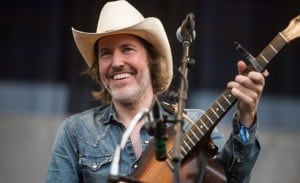 Gillian Welch and Dave Rawlings are returning to Auckland in January for what is one of the most anticipated shows of the new year. It’s been over a decade since the duo last performed here and they’ve made a lot of great music since then. Their most recent collaboration is Nashville Obsolete, released under the name of the Dave Rawlings Machine, earlier this year. The 13th Floor’s Marty Duda spoke to Dave Rawlings a few days before Christmas and found him puttering around in his studio, where he has produced acts such as Old Crow Medicine Show and Dawes. Listen in as Dave talks about the making of Nashville Obsolete and what fans can expect from the show on January 28th at The Civic.
Gillian Welch and Dave Rawlings are returning to Auckland in January for what is one of the most anticipated shows of the new year. It’s been over a decade since the duo last performed here and they’ve made a lot of great music since then. Their most recent collaboration is Nashville Obsolete, released under the name of the Dave Rawlings Machine, earlier this year. The 13th Floor’s Marty Duda spoke to Dave Rawlings a few days before Christmas and found him puttering around in his studio, where he has produced acts such as Old Crow Medicine Show and Dawes. Listen in as Dave talks about the making of Nashville Obsolete and what fans can expect from the show on January 28th at The Civic.
Click here to listen to the interview with Dave Rawlings:
Or, read a transcription of the interview here:
MD: You’re in Nashville, is that right?
DR: Correct. I’m in Nashville. We don’t start playing again until the day after Christmas.
MD: Excellent! So are you revving up for the holidays?
DR: I suppose. I mean, we’ve been on the road quite a bit so I’m actually just doing what I normally do. I’m working on some stuff and I’m actually doing some stuff in the studio the last few days.
MD: What kind of stuff?
DR: I was working on a couple tracks for some older tapes of some Old Crow Medicine Show stuff. I think they’re going to release a compilation of some kind and they wanted a couple of unreleased tracks, so I dug those out and have been doing some edits and mixing and stuff like that…just various things. But we’re always playing music. You know, I went over and played with Britt (Brittany Haas), who plays fiddle with us, and a banjo player friend of hers the other day…you know, just keeping busy.
MD: Very good. Is that what your life at home is like, just playing around with different people?
DR: Yeah, usually working on songs and working in the studio. You know writing takes a decent amount of time, but yeah, I tend to work all the time because there’s also the issue of booking the tours or doing what we’re doing right now, talking about stuff. I mean, I kinda wake up in the morning and I…usually morning-ish, I get up at 10 or 11and I’m usually still working at 3 or 4am…which is fine man, I love it. I don’t have any problem with it at all.
MD: And of course you guys run your own record label as well, which I assume takes quite a bit of time.
DR: Correct, yeah, no, there’s plenty of things to do. If you ever have free time call me up and I’ll tell you what you can do to help us out.
MD: Fantastic. I know you were looking into trying to get some vinyl releases at some point. Has anything happened with that yet?
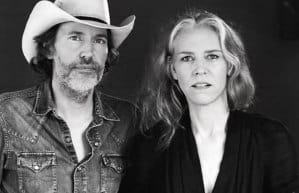 DR: Yeah, yeah, we’re working away on that. I actually just spoke to the guy who we’re working with about an hour ago and, yeah, we’re clicking along. Everything always takes longer than you want it to and that’s definitely taken longer than we wanted it to, but we’re getting close so hopefully there’ll be news on that in not too terribly long. I expect the holidays will hang things up for a minute, but, you know. It’s a lot of fun to work on stuff like that though. I’m really proud that when we get our vinyl together it’s going to be about as high quality as it can possibly be. I mean a lot of people make records, make a vinyl record, by going into a…you know, just taking a digital version of something and going in and having somebody cut it in sort of whatever quality and it’s all kind of just about putting on the artwork and it being on vinyl. But the records I always loved were sort of meticulously crafted and sounded really good. So we’re hoping to be in that camp.
DR: Yeah, yeah, we’re working away on that. I actually just spoke to the guy who we’re working with about an hour ago and, yeah, we’re clicking along. Everything always takes longer than you want it to and that’s definitely taken longer than we wanted it to, but we’re getting close so hopefully there’ll be news on that in not too terribly long. I expect the holidays will hang things up for a minute, but, you know. It’s a lot of fun to work on stuff like that though. I’m really proud that when we get our vinyl together it’s going to be about as high quality as it can possibly be. I mean a lot of people make records, make a vinyl record, by going into a…you know, just taking a digital version of something and going in and having somebody cut it in sort of whatever quality and it’s all kind of just about putting on the artwork and it being on vinyl. But the records I always loved were sort of meticulously crafted and sounded really good. So we’re hoping to be in that camp.
MD: Yeah, I think I read that Neil Young had a rant about that a little while ago where he was complaining that people were just putting the digital versions and mixes onto vinyl and not giving any consideration to the format itself.
DR: Yeah, it’s interesting, we were acquainted with one of the guys who worked for Warner…who works for Warner Brothers, and he was heading up the vinyl department and I actually got to hear a bunch of test pressings that they did for some of Neil’s stuff from various…you know they sent the same acetate to a number of different pressing plants and things and the difference in quality is really staggering. To hear the same music come back three or four different ways and have one clear winner where you’re like, “That’s what I want to listen to right now!” It was amazing. You know, I always like when an artist is that committed to what they do.
MD: Yep, yep, because I guess for a lot of people it’s just a fashion statement as well.
DR: We’re not making widgets here, you know.
MD: Exactly. Now, a lot of people are very excited about the fact that you guys are coming down to Auckland because I think you’ve only been here once and it was in 2004. I saw the show; it was at the St James Theatre. I was just wondering if you had any memories of that. I know you’ve done a lot of stuff in the interim.
DR: Sure, no, that was a thrill for us. The fact that we had…at that time, when we booked that tour, we didn’t really know that much of what the demand would be, or if people would want to come out and see the show, or what the response to the music would be. That was a great show. It was a lot of fun for us to come down and be accepted in a place so far away and so very beautiful. So we’ve been looking forward to coming back for quite a while. I mean, I don’t like to fly at all so it’s a long way to get me on an airplane. I haven’t probably been on an airplane in five years so this’ll be a big deal but…
MD: You haven’t been on a plane in five years?
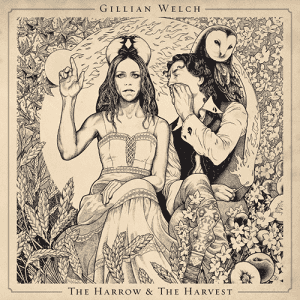 DR: I don’t think so. I mean, well, let’s think about this…maybe four…’cos we went to Europe with The Harrow & The Harvest tour, and we did two flights. We flew into Dublin and then we drove all the way around and then I think we flew out of Stockholm. So, that’s the last time I remember flying. Before that, I don’t know when I flew. It’s OK, I mean, we travel all the time, we just like doing it by car. We both like it better too so it’s easy.
DR: I don’t think so. I mean, well, let’s think about this…maybe four…’cos we went to Europe with The Harrow & The Harvest tour, and we did two flights. We flew into Dublin and then we drove all the way around and then I think we flew out of Stockholm. So, that’s the last time I remember flying. Before that, I don’t know when I flew. It’s OK, I mean, we travel all the time, we just like doing it by car. We both like it better too so it’s easy.
MD: It doesn’t get too claustrophobic staying in such close quarters with each other for so long?
DR: Oh I don’t know, we’ve got a pretty big vehicle and we’ve got other people with us. It’s a lot of fun. Look, I don’t know how much you like to road trip, but it’s always been something that we both enjoy.
MD: When you come here in Auckland you’re just doing the two of you and then later on when you get to Australia you’re doing the Machine thing, is that right?
DR: Yeah, that’s correct. Auckland slated on to the front and then we figured if we were going to do just one show we probably ought to let it be Gil’s show because I felt like people would be …you know the band itself is busy so we kinda needed to do it that way. Hopefully we’ll slip something in from the new record to appease those who would be happy with it.
MD: I think people will just be happy that you’re here so you won’t have to worry about appeasing too much. But let’s talk a little bit about the record. First of all, the title is Nashville Obsolete and obsolete is usually not a word that crops up in popular music very often because it has an awful lot of negative connotations. How did you come about using that terminology to title the music?
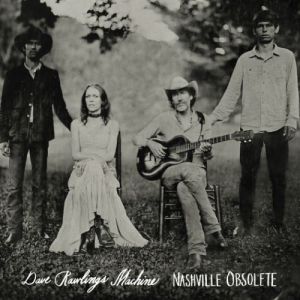
DR: Well I like the way the word obsolete rings with machine because machines become obsolete. You know, the title itself, strangely…because we have this old recording studio that we work in and we work on tape…you know, there’s a lot of times that in the world of making music…you know, playing a guitar from 1935 or using a microphone from 1951…that you run into these issues of obsolescence where you need a part and that part just doesn’t exist and you have to manufacture it yourself. Or you have to do this great long snipe hunt in order to come up with whatever you need. And so we’ve got a room down the studio, this basement, that opens up onto the street, and we thought one day we should put a business down there and we’ll call it Nashville Obsolete and we’ll just sell things people don’t need. If you don’t need it, we’ve got it! So the phrase Nashville Obsolete, without any negative connotations, has been in our world for a year or two. And when we think of something like, you know, typewriter ribbon, when we all of a sudden have to type up the lyrics to something, we go, “Oh, we should sell that in Nashville Obsolete, we’ll put it on the mail order list, you know”. So, for some reason, when we were trying to title this selection of songs and we realized so much of it was about change and travel and just…well, change, really…that combined with the fact that Nashville has changed so much in the last decade. And in the last five years the growth has been amazing and so many things…you know, I don’t really have a…I’m not going to stand here and say that it’s worse or better, but it’s changed. You know some things I like are gone and some new things I like are here. But, there’s definitely some things that have been made obsolete and the music business itself has made certain things a bit obsolete. Once you’re paying a couple hundred dollars for your phone and your internet, you know it’s hard to convince people that they should be paying anything for the entertainment that’s on that. Your sort of service provider makes all of the money and the creative content people, the people who make what you actually want out of your pipeline, you don’t pay. So, we think about that sometimes and we think about ourselves. We’ve been doing this a long time and you know, you start to feel obsolete yourself in a certain way. But it’s not all negative, it’s like anything else. Sometimes things become…and this is something that Gillian has said…sometimes things become obsolete because the quality was too high. People didn’t want to do the work anymore, or whatever. The system changes. So I wanted to take all that stuff and just throw it out there. And you know, actually, it just sounds like a title too, Nashville Obsolete. To me any title is good if you hear it once and you remember that’s what it’s called. I couldn’t tell you why Bob Dylan’s record is called Blonde On Blonde…
MD: That’s true, I never thought about that!
DR: Right. I can’t see exactly how it connects to the music but it was a good title. There is a sort of golden hue to that music in that sort of synesthetic way…like, I get it and I’m OK with it and I kind of thought Nashville Obsolete, in some sort of a way, attached to this music pretty well.
MD: I know that Gillian has said that she looks at this as your first record…The Dave Rawlings Machine…even though you had Friend Of A Friend a few years ago. So, do you feel the same way and how would you compare the two records?
DR: Well, I don’t know, she may have said the same thing, and forgive me if she did, but, you know, Friend Of A Friend, because it contained songs that I’d co-written with other people over the years and some different covers that I had learned to do by playing with other people over the years…like something like Method Acting…I’d learned that song when I’d gone out to play with Bright Eyes a little bit because they needed someone to fill in for Mike Mogis. You know that record, we wrote a few songs to finish it up, but it was more of what I say that I think is funny, it was like a greatest hits for five records that we never made. Not that any of them were hits, but you know what I’m saying. So we kind of felt that that’s what Friend Of A Friend was and this was the first record that once we got a couple songs together and you know, generally with the material that Gillian and I write together it comes out of feelings we have, conversations we have and just what’s on our mind. And so, this record was created that way and I’m happy with that. I think that it has a cohesive feeling to it. I think it seems like an artistic statement. I also like records that are a little bit of a mixed bag. There’s a lot of records that I point at that are in my collection that feel that way. But I’m glad to have done one of these now. And I don’t think that that’s a bad way to look at it, that this is the first time we sat down and made a Dave Rawlings Machine. The first one just kind of happened, to be honest.
MD: So you say you sat down with the idea of making a Dave Rawlings Machine record. Did you talk about it explicitly or did you just kind of know what it was you were attempting to do?
DR: Well, I think the first couple songs that we started to get into shape were the songs The Trip and The Weekend…there was pieces of those. Now some of the other songs, there were little tiny fragments, they were germs that later…that things would sort of turn into something else. There might be a little song that then would eventually get shifted into something…but those were the first two that we started to think, “Well maybe I’ll sing that, The Trip song. Maybe that’ll be a Machine song”. And then we kind of really dove in with Pilgrim was the next thing that we really started working on and when we got that finished, that was a little bit of a signpost that we had something, that we were…the we just noticed that we sort of kept focussing on the same things and the same themes and that these overarching topics were crossing from song to song and from lyric to lyric. That happens with our records a lot and that’s kind of when we start to know that we’re getting close to something that we’re going to be happy with really soon.
Click here to listen to The Trip from Nashville Obsolete:
MD: I guess that feeling doesn’t happen as long as you’d like it to because you guys had a stretch in there when there was not much new music coming out.
DR: Yeah, I mean, yeah there definitely was a long period of time that we were writing things but in the end we just didn’t think there was much…we were saying much. It would be one thing…and I don’t know if I’ve said this much in any press…but I think it’s relevant, the question, or the comment you just made…and that it is that if earlier in our career we had written some song that we thought was kind of, mmmm, not so good, but we threw it into the set, you know, we played it live one night back in the days where you could play a song live and it didn’t immediately appear worldwide on everyone’s phone…we’d go, “Let’s throw this in Detroit tonight. We’re in Detroit, let’s try this song, we were just banging around in the dressing room, let’s play it”. If we had had an experience where stuff that we were dissatisfied with, people had gone crazy for, maybe we wouldn’t behave the way we do, but generally throughout our career, or pretty much exclusively, if we’re not real satisfied with the song, people aren’t either. You know, the records that we were less satisfied with at the end are the records that sold fewer copies. It seems like we have a decent…and I guess that’s part of the reason why, I guess I produce the records…I mean Gil certainly does some work on it that you would call production…but we self-produce our work because we have that sense. I’ve worked with artists who haven’t the slightest idea what the best thing that they do is or what’s going to be most appealing to people. I mean, we started this conversation and I was talking about working on Old Crow Medicine Show, you know they have this song Wagon Wheel that was actually quite ??? in the early days. They were so tired of that when we started to make that first record and no one had ever heard the thing. I was like, “That’s gotta be on the record.” And we had to cut it three different times, three different sessions to get an acceptable version of it…that sounded OK. But a different person could have talked them into not putting that on the record in one word, go, “Ah, yeah, I don’t like that song.” I feel like Gil and I are more on the page where if we had a Wagon Wheel in our pocket…I remember the first time Gil played me something that would become Orphan Girl, we were kind of immediately like, “OK, that’s a good one.”
MD: I’m curious, because Dawes was just here a few months ago and I love the album and their live show was equal or superior, so, can you tell me anything about the making of that record and your involvement? Where there any scenes like that?
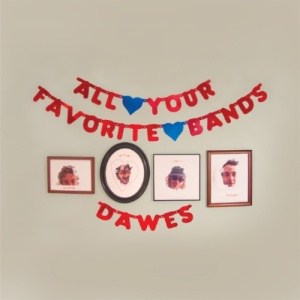 DR: Sure! I have known those guys for a long time. I crossed paths with them in California I think when they were still Simon Dawes, you know, before they had really done any recording and this friend of mine, Jason Boesel, who was playing with Bright Eyes and also played in Rilo Kiley, I just happened to be in California, in LA, and he said, “Man, go up to North Hills because there’s these kids I know and they jam, you know, they’ll be jamming in their house.” I guess they knew my guitar playing a little bit, but he said, “Just go out and knock on the door.” So I went out there and I…and we jammed, Blake Mills was there and I guess he was still playing with them at the time, and you know, it was a great time. So since that time, I kind of kept my eye on them and knew that I thought that they were really talented and liked what they did. But we just never had a chance to work together. And so they were starting to look into making this last record. I knew they we talking to some pretty big producers but we share the same manager and I just said in an offhand way to our manager, I said, “You know, I think I’d do an OK job working on a Dawes record if that ever came to pass.” So I kind of threw my hat into the ring and all of a sudden it was happening, which was a surprise to me but I was really flattered that they wanted to work together. And I think part of the reason they wanted to work together was they knew I was going to set them up and record them live, which they had never done. You know, Taylor and Griff looking at each other and playing like they would in a room. And I think maybe Taylor overdubbed two lines on the whole record and that’s all live vocals. And their just so talented and they have such a rapport with each other from playing all those shows that it was really a pleasure to work with them that way. And Taylor came in a couple weeks before and we worked a little bit on songs and talked through stuff…and you know, Taylor is definitely a guy who thinks about his writing a lot…and there were things that I would maybe on certain songs…you know Taylor likes to write a lot in songs…there might be two or three or four or five bridges on the cutting room floor that were very long arguments.
DR: Sure! I have known those guys for a long time. I crossed paths with them in California I think when they were still Simon Dawes, you know, before they had really done any recording and this friend of mine, Jason Boesel, who was playing with Bright Eyes and also played in Rilo Kiley, I just happened to be in California, in LA, and he said, “Man, go up to North Hills because there’s these kids I know and they jam, you know, they’ll be jamming in their house.” I guess they knew my guitar playing a little bit, but he said, “Just go out and knock on the door.” So I went out there and I…and we jammed, Blake Mills was there and I guess he was still playing with them at the time, and you know, it was a great time. So since that time, I kind of kept my eye on them and knew that I thought that they were really talented and liked what they did. But we just never had a chance to work together. And so they were starting to look into making this last record. I knew they we talking to some pretty big producers but we share the same manager and I just said in an offhand way to our manager, I said, “You know, I think I’d do an OK job working on a Dawes record if that ever came to pass.” So I kind of threw my hat into the ring and all of a sudden it was happening, which was a surprise to me but I was really flattered that they wanted to work together. And I think part of the reason they wanted to work together was they knew I was going to set them up and record them live, which they had never done. You know, Taylor and Griff looking at each other and playing like they would in a room. And I think maybe Taylor overdubbed two lines on the whole record and that’s all live vocals. And their just so talented and they have such a rapport with each other from playing all those shows that it was really a pleasure to work with them that way. And Taylor came in a couple weeks before and we worked a little bit on songs and talked through stuff…and you know, Taylor is definitely a guy who thinks about his writing a lot…and there were things that I would maybe on certain songs…you know Taylor likes to write a lot in songs…there might be two or three or four or five bridges on the cutting room floor that were very long arguments.
MD: A bridge too far, huh?
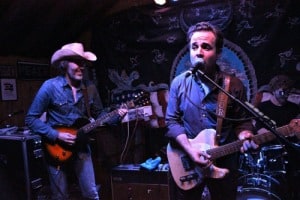
DR: Yes, well you know…I think the song that was the first single, Things Happen, I think that ended up having two bridges surgically removed from it by the time we were done. But hopefully, in my world when I’m trying to produce something like that, you just have to trust yourself. You know, when they played that song and they played it straighter and tighter, I thought that the message that it put across came through stronger. I didn’t think that going to a different place musically was really helping it and those are the things that as a producer, you kinda have to…you have to trust your own opinion because it’s all that you have and if, in the end, the band doesn’t agree with you, or if in the end, the world doesn’t agree with you, well then, you have to decide maybe you shouldn’t be a producer.
MD: Can you give people an idea of what they can expect as far as the show that’s going to be coming in Auckland? I know I’ve seen that you guys are doing a few covers…some Dylan and The Band and older things, Bill Monroe and stuff like that.
DR: Well the Auckland show, because it’ll be a duet show, is going to be a decent amount of the stuff off the last record, Harrow & The Harvest, you know, the last Gillian Welch record. I think we’ll probably try…because we’re not coming back…probably try to sneak in a thing or two from Nashville Obsolete. But we’ll be focussing on the duet catalogue. We usually do play a couple…a traditional song or some sort of…there’s usually a cover of one kind or another because something will just come to mind and we like playing them. Yeah, that’s what we’re bringing and Gil will be singing almost all the songs which is the way we do those shows. So, I guess you could look at it as…you know you could remember what you were doing in 2012, when we shoulda come down and done that tour…go back in time in your mind. You’re going to get that with a little bit of bonus.
- Civil War – Dir: Alex Garland (Film Review) - April 9, 2024
- Pearl Jam – Dark Matter (Monkeywrench/Republic) Album Review - April 1, 2024
- Blonde Redhead – New Zealand Tour 2024 - March 14, 2024
